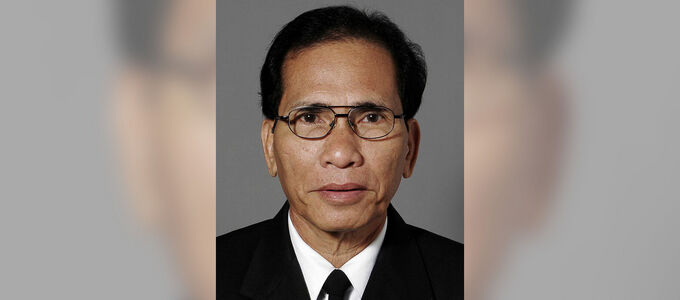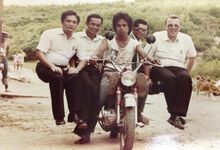Language is the key to people’s hearts
He spoke the language of faith. But he also spoke the most widely spoken language in the Philippines. Apostle Virgil Fuentes died ten years ago today. One of his works that live on is the translation of the Catechism into Cebuano.

The Philippines is an island country consisting of 7,641 islands. For the people there it is not unusual to board an inter-island ferry to get from A to B. When a Filipino pastor and a Swiss tourist met on such a boat from Tagbilaran to Cebu way back in 1977, it changed everything for the pastor and the nascent Church in the Philippines.
A pastor and a tourist meet
After completing his schooling, Virgil Fuentes entered a Bible seminary of a Protestant church in Misamis Occidental, his home province. His mother was a qualified teacher, his father owned a business, and Virgil, who was born on 25 May 1941, had five younger siblings. He described his childhood as sheltered: “Thanks to their hard work, my parents were able to offer us a good and secure childhood in spite of the bad times of war.” In 1964, Virgil married his wife, Perla, and they had four sons and a daughter.
The qualified minister met the Swiss tourist on the aforementioned boat in 1977, who told him about the New Apostolic Church. Virgil Fuentes later wrote about this encounter: “I became curious and wanted to find out more about this teaching. What particularly captivated me was the reference to living Apostles, who were once again active.”
An emerging Church
The New Apostolic Church was only just emerging in the Philippines. District Apostle Michael Kraus had sent young men like Herbert Pache and Urs Hebeisen to the archipelago to spread the gospel and establish the Church. Although he had never actually met an Apostle, Virgil Fuentes accompanied the young Priest on his travels throughout the country. The young Priest could do with the help because he was neither familiar with the local conditions nor with the language.
“As a trained pastor, Virgil Fuentes was able to quickly grasp and support the mission of the New Apostolic Church,” District Apostle Urs Hebeisen later said. In 1979, an Apostle finally arrived in the country in the person of Erwin Wagner. Over a hundred believers received the Holy Spirit on 5 December, including Virgil Fuentes and his whole family. One day later, the Apostle ordained him a Priest. Of course, this cost Virgil Fuentes his job. But District Apostle Urs Hebeisen, who is now retired, tells us, “Brothers who were committed to our New Apostolic Church and worked for it received some financial support.”
Prayer works: the experiences of a man of God
Sometimes Virgil Fuentes had trouble and conflicts with members of his former denomination. “Thank God these turbulent days are a thing of the past,” he later wrote in an article for the Our Family magazine. “The foreign spirits that had found their way into the hearts of my persecutors were driven out with the help of prayers.”
He often travelled from island to island in simple boats and had his share of experiences. “As we crossed the sea, dark, threatening rain clouds gathered and it became pitch black around us. I sent a silent sigh to God and asked Him to protect us. Then suddenly, miraculously, the dark clouds parted, the sun broke through, and a strong wind drove the storm clouds apart.”
Also the worries in connection with his conversion to the New Apostolic faith, that had hung over him like clouds, soon cleared. He was even able to help us establish contacts to other religious denominations, Urs Hebeisen says. “As a Protestant pastor, he naturally knew many people and introduced us to his colleagues,” the retired District Apostle Hebeisen says. “This led to numerous contacts that we would today refer to as ecumenical.”
Through language to the people’s hearts
In 1986 Virgil Fuentes was invited to a divine service by the Chief Apostle in Kitchener, Canada. On 8 June then he was ordained as the first Apostle for the Visayas—one of the three principal geographic divisions of the Philippines—by Chief Apostle Hans Urwyler.
“His excellent knowledge of English made him indispensable for interpreting at the altar and for translating our publications,” District Apostle Hebeisen relates. “Language is the key to people’s hearts, that was Virgil Fuentes.” His mother tongue was Cebuano, one of the most widely spoken languages in the Philippines. It is spoken by around 18 million people. It took Apostle Fuentes around a year to translate the Catechism of the New Apostolic Church into Cebuano.
His work lives on
Chief Apostle Wilhelm Leber retired his faithful colleague on 12 February 2006 in Manila, the capital of the Philippines. On 7 June 2014, while many New Apostolic Christians were gathered in Munich in Germany for the International Church Convention, Virgil Fuentes passed away. His friend and co-worker from the very beginning, District Apostle Hebeisen, learnt of his death at this event. “The first reaction in our Munich Philippines delegation was: now he’s here with us,” he says. “I worked with him for many years and built up God’s work on Bohol and the Visayas with him. His last major project was the translation of the Catechism. His passion was music! We remember with gratitude all the works this man of God accomplished.”
Article info
Author:
Date:
Keywords:
Katrin Löwen
06.06.2024
Philippines,
Apostle,
Doctrinal instruction,
People/Personalities





